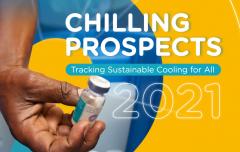National Cooling Action Plans
National Cooling Action Plans (NCAPs) are strategies or roadmaps that promote sustainable and smart cooling practices across a country. These include the identification of groups that are vulnerable due to a lack of cooling; promoting the adoption and increased stringency of Minimum Energy Performance Standards (MEPS), and identification of potential financial mechanisms for cooling.
NCAPs can also include measures that can support countries to achieve major international treaties such as the Kigali Amendment to the Montreal Protocol and the Paris Agreement. NCAPs also provide a framework for coordination and cooperation among stakeholders and government agencies recognizing the cross-cutting nature of sustainability interventions in the cooling sector.
Overview of progress by countries
More countries are recognizing the risks caused by a lack of cooling and are in the process of establishing these plans. NCAPs have been published by Cuba, China, India, Panama, Rwanda and Trinidad and Tobago. In 2020 the COVID-19 pandemic caused a significant delay in the publication of other NCAPs previously in development. Currently, over 20 countries are developing NCAPs.
The map below shows an overview of countries currently working on their NCAPs, and where possible, the prevalence of SEforALL’s identified groups of vulnerable populations in the country.




